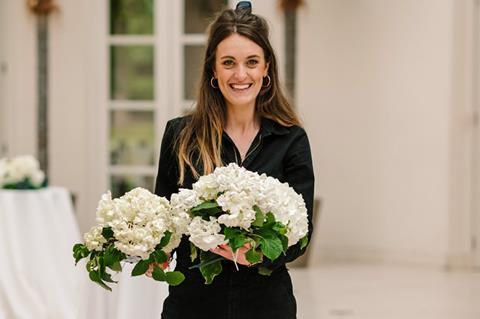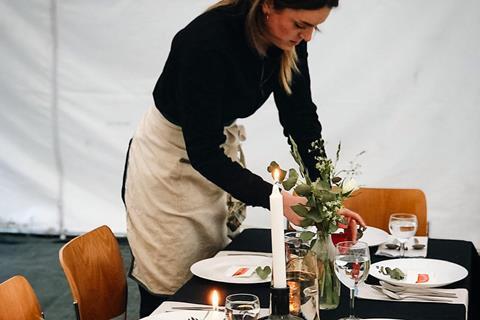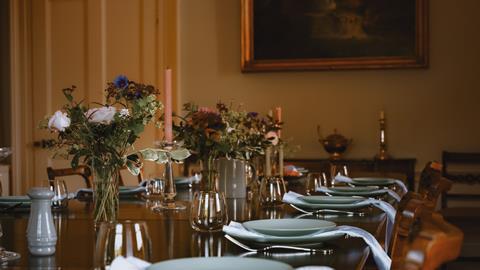Through her events business, Ali Gillum creates spaces to help others mourn and celebrate in a personalised way
Tavola is the Italian word for table. It is around this – with all that it represents – that Ali Gillum has built her business, Tavola Events. Through it she ‘sets a table’ for clients who want to celebrate the joyous moments and milestones of life, and now increasingly for those going through the heartache of death.
A Christian from a young age, Ali grew up in London where family life tended to revolve around a big wooden table that her dad, a vicar, had made. It was the heart of their home in every way – a gathering place for her parents and siblings to talk, laugh, play games, cook and eat together. Over the years her mum and dad have been distinctive in how they have welcomed people into their home and to this table: “My parents have been great role models for me…they host all different types of people. And they always remain themselves – they host from who they are.”

A shift in direction
Since her school days, Ali had wanted to work for herself so quickly set about building her skills. Working for a social media agency straight after university she then switched to doing events, which took her to New York for two years working for a US-wide entrepreneurship programme. When COVID hit, she went back to London and found work in a doctor’s surgery to bring in money, while she began developing her events business. She went full time with the business in 2023 and estimates she has now facilitated roughly 200 events, at venues across the UK, in Europe and beyond: including parties, fundraising dinners, team days and about 60 wedding receptions. However, she is now focusing her business increasingly on funerals, and the reception or ‘wake’ that follows. It’s a direction she’s been heading in for some time and which came out of a passion kindled through circumstance.
During the pandemic, Ali lost two close family friends, neither of whose deaths were COVID-related. It rocked her family. Grieving them was made all the worse by the fact that no one could gather together in person. She remembered an experience she’d had in a New York bookshop, just before returning to the UK. She had picked up Option B by Sheryl Sandberg (WH Allen), which tells the story of her husband’s sudden death on holiday in Mexico. In its aftermath, Sheryl was forced to reimagine her whole life as she grappled with his absence. Consumed with grief at the time, she describes how people she knew would cross the road rather than speak to her, because they didn’t know what to say. Ali read the book in one sitting, in the middle of the busy bookshop, sobbing her way through it: “And I’m not really a crier”, she says. It was profound: “[Sheryl] shares beautifully and with such rawness about her journey of grief…my main takeaway was; we just don’t engage with grief.” Ali observes that: “especially in our Western culture, we keep an arm’s length from grief, and we just think, ‘oh, they need to be by themselves’”. But in many other cultures: “people just congregate, they’re there – they wail together, they’re present in the grieving process…there’s something so powerful about bringing people together in a way that is not ‘over-organised’…just being together in a room.”
There’s something so powerful about bringing people together in a way that is not ‘over-organised’
Ali notes that people love organising a wedding reception, planning them down to the last detail, “but nobody wants to organise a funeral”. As a result, funeral receptions are typically under-organised, more perfunctory, underscoring the fact that mourners need not linger. For Ali, it’s a missed opportunity for something more thoughtful, which creates a safe space for people to gather. And where an “abundant table” of food and refreshments (instead of minimal catering) can provide a focal point, it gives guests permission to dwell: “It’s the last event that person [who has died] will be present in…I think you want to create space where you can both mourn and celebrate…feel desperately sad and [especially as Christians] have this deep hope that death is not the end.” It can be kept simple: “it’s not about throwing money at it”, she says, and be held at the back of the church rather than in a swanky venue: “personally, I think that’s better, because you’re then able to signpost people [there] for a quick drink…or [they] can enjoy just showing up. [It says] ‘You don’t need to do anything, just be here.’”
The importance of fluidity and flexibility
Ali has built the business around herself. She thrives on navigating logistical challenges and pulling things together at the last minute. And she prefers being relational – working alongside clients in a fluid, non-transactional way: “I don’t work with people where they’re like, ‘Oh, I just need to book your services.’ I’m like, ‘No, no, no, we’re two people working together.’” This is especially important when it comes to working with people who are recently bereaved: “the capacity of the client is really important to remember; in grief [it] totally shrinks, and their ability to communicate [too]”.
Developing trust is therefore of the utmost importance, so being flexible enables Ali to build rapport with clients and can be game-changing for the event itself. For example, saying ‘yes’ to a drink in the pub after finishing an event run-through became an opportunity for one client to tell her more about the beloved wife he had just lost. By listening, Ali could bring more warmth and humanity to an otherwise joyless experience: “I’d like to think that maybe he [thought]: ‘Well, this isn’t just an anonymous events planner that we’re working with. It’s Ali,’” she says. Mindful of the care and empathy involved she concludes: “This is why I really enjoy working in this space…there’s just more tenderness.”
Adding special touches is also important. The same client’s wife had loved flowers, so for the funeral Ali created a huge flower arrangement for display at the front of the church. Afterwards, as guests gathered around tables of food at the back with their drinks in hand, she moved the arrangement near the doors, inviting guests to choose a flower stem to take home with them. This meaningful token further helped to “rearrange death’s dismay into beauty” (as it says on her website), demonstrating that these occasions can still be full of life despite the sadness and loss.

The privilege of carrying the load
Ali’s ‘at-home’ style of hospitality means people seeking something sleeker and smarter should look elsewhere: “I’m not high-end. I don’t want to be high-end,” she says. And while scale is said to equal success, she would rather maintain a hands-on approach: “I don’t want to scale the business. I don’t want to build a massive thing. I want to keep it where it is.” This sharpens her approach. As she’s not compelled to work with everyone, she’s free to work with the people who resonate most with her brand, including the suppliers and freelancers who make up her team. It also enables her to be present with clients in a way that running a bigger business wouldn’t allow: “I think there’s actually something beautiful in smaller companies that maintain who they are,” she says.
There are three flexible options for Ali’s funeral receptions; the ‘Full Tavola’ where she handles everything; the ‘Simple Tavola’ which leaves the planning and preparation up to clients, while she takes care of the logistics on the day. And ‘Tavola Flowers’ where she makes flower arrangements for the funeral, reception or both. Most of all, Ali wants clients to feel as if they are hosting in their own homes, without the “practical headache” that comes with larger events and venues: “[I] carry that load. But not [so] much that the family and loved ones don’t feel involved and empowered within that.”
For Ali, it all makes perfect sense: “funeral work feels different to my other events’ work”, she says. “It feels like being able to bring in who I am, who I believe God to be. And then work with people from that place…it feels like a privilege.”
Words by Alex Noel


































No comments yet